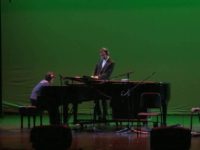Joanna Duda belongs to Poland’s latest generation within its rich, experimental jazz tradition but her piano talents are only a part of the story with her. Leveraging technology in uncanny ways, her music is digital alongside analog, acoustic alongside electronic and improvised alongside charted. The product of this crossbreeding is music that doesn’t neatly reside in any known world but in a world of its own.
In the 2018 Jazzahead performance below, we see Duda leading a trio invoking classical and jazz to create an electro-acoustic brew while interacting effectively with a traditional standup bass/drums unit, reminding a bit of Matthew Shipp’s past dabbles with electronics but with her own piano diction:
Bringing a minimalist bent to a prepared piano along with some electronically-altering effects, Keen covers much of the same ground as Kelly Moran’s Bloodroot (2017) but using a wider array of electronic tools to augment that piano. Here is only Duda’s second release, the first one The Best Of involving other musicians. This time, Duda does it all by herself.
The jazz and classical elements heard at Jazzahead are largely stripped away, or perhaps it’s more accurate to state those influences are pushed way in the background. What’s in its place is a mind-tingling communion of piano, samples and effects that largely ignores established ways of making music although it’s also peppered with pretty moments (the first half of “Choinka,” for example).
Duda commences “Marc” with the prepared piano and then proceeds to introduce various laptop-generated sonic contortions, ramping up the trippy-ness level. She makes (I’m guessing here) the altered piano mimic the sound of a Japanese koto on “Agnus” and completes the otherworldly picture with exotic percussion.
“Fugue” transmutes sounds by playing notes backwards and altering pitches, opening up to a parched sonic landscape sprinkled lightly with lonely piano notes, contorted voice samples and looping of a snippet of conventional music. “Keen” explores the dirge range of the piano with drone approaches as Prince’s drum machine from 1999 goes awry. “Stnk” dispenses with the piano altogether for most of the track, relying entirely on circuited noises, then when that piano finally does emerge, its impact is felt greater by its prior absence.
Running at a tidy thirty-one minutes long, Keen packs at least a couple of hour’s worth of inventions. You may have guessed by now that this music is intended only for the very open-minded but it works pretty well for disinfecting your brain of preconceived notions of music.
Purchase a digital copy of the album through Duda’s Bandcamp page.
- Tomeka Reid Quartet – ‘3+3’ (2024) - April 30, 2024
- Claudio Scolari Project – ‘Opera 8’ (2024) - April 25, 2024
- Nick Millevoi – ‘Moon Pulses’ (2024) - April 23, 2024




